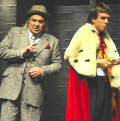
The play takes off from ancient myths—Oedipus, Persephone, and other primal stories of parents, children, and death—but them leaves them far behind. Except for his finely-tuned Hebrew language, Aloni (one of Israel’s leading playwrights and translators of plays, who died in 1998) removes his story entirely from the Israeli context that hangs so heavily over so many of this country’s original works of drama. The action takes place in an unnamed South American country and the two main characters are the deposed king of a Central European principality and his wayward 20-something son. The Khan’s Arie Tcherner and Udi Rotschild offer flawless performances in this sonata for two actors, under the fine direction of Udi Ben Moshe.
When King Bonifacius Victor Felix of the House of Hohenschwaden encounters, his son, Crown Prince Ferdinand, after midnight, at the train station, on his way to visit the prostitute whose services his son has just enjoyed, the tragic ignorance of each about the other is illuminated under the stark light of the street lamps. The King does not know that his son knows about his twice-weekly visits to the whore; his son thinks he knows his father’s routine and motives, but can’t understand his pain. He treats his father’s past as a fiction and turns it into a spectacle—a film about his father’s usurpation.
But the king also forced his son into a fantasy, treating him not as his boy but as the heir to the throne of Great Bogomania, a country that, if it ever existed, has erased them from its history. Each sees the other as a fiction, and the material of farce becomes the stuff of tragedy.
This is theater at its simplest and its best, two actors on an almost bare stage, riveting us with their conflicts and misapprehensions for an hour and a half, no intermission, without a single false moment. If you’re in Jerusalem, see it.





